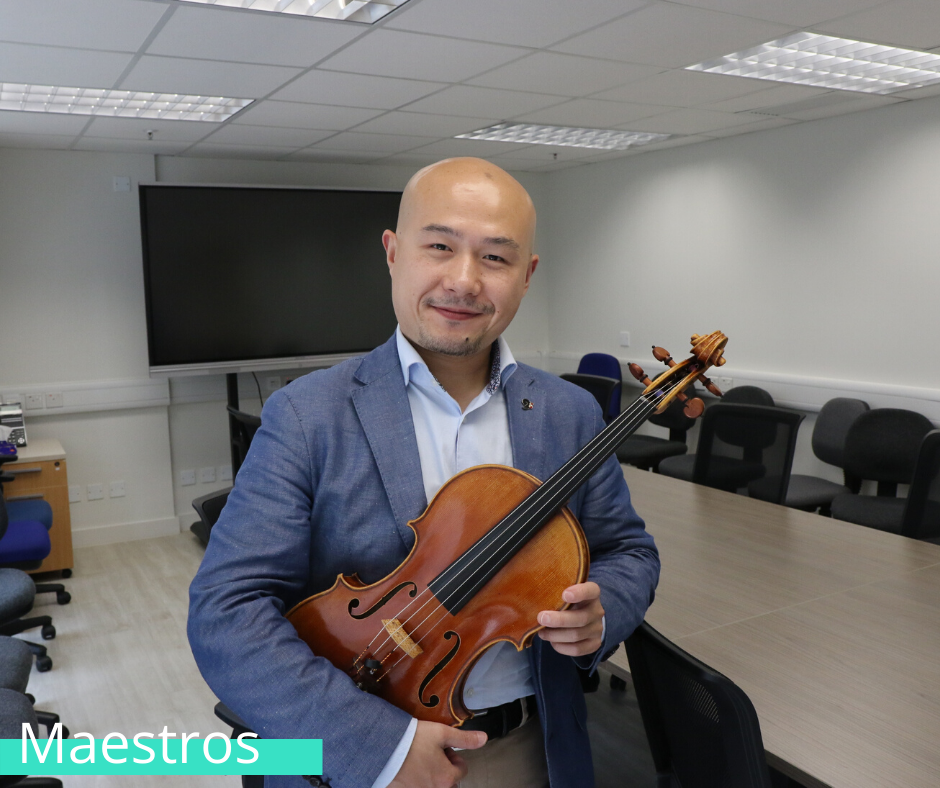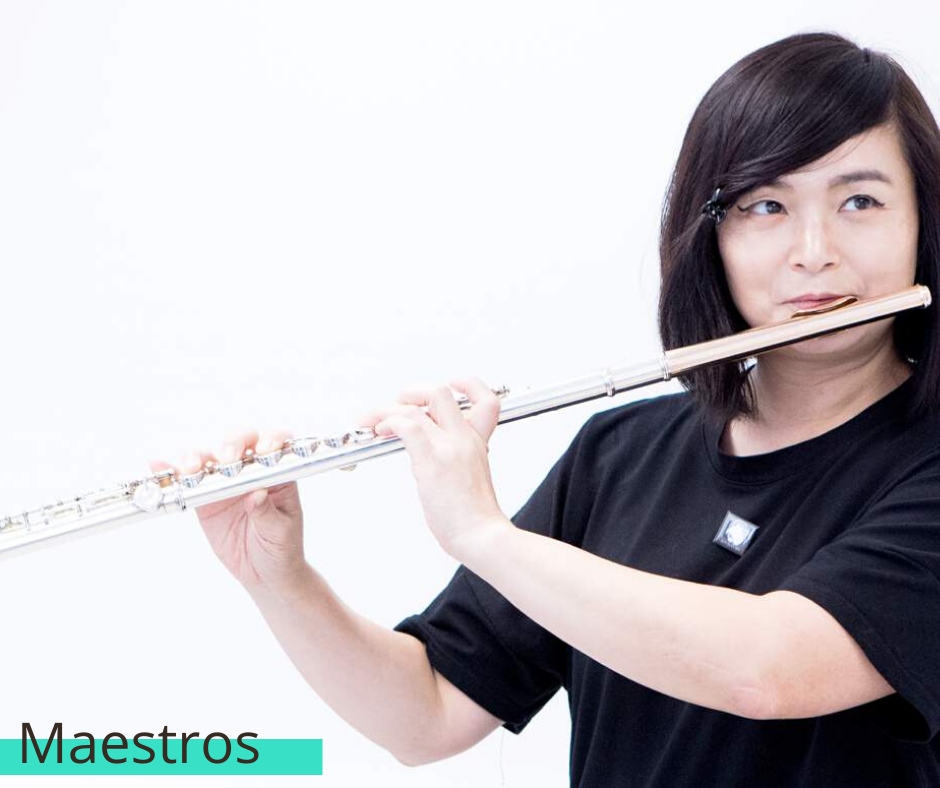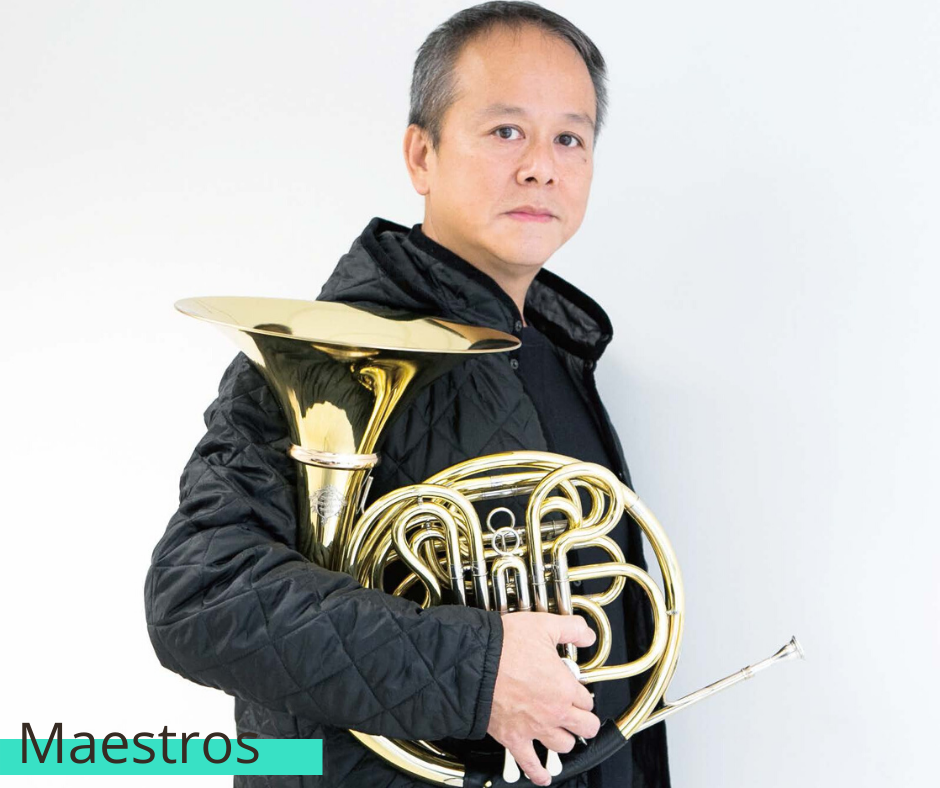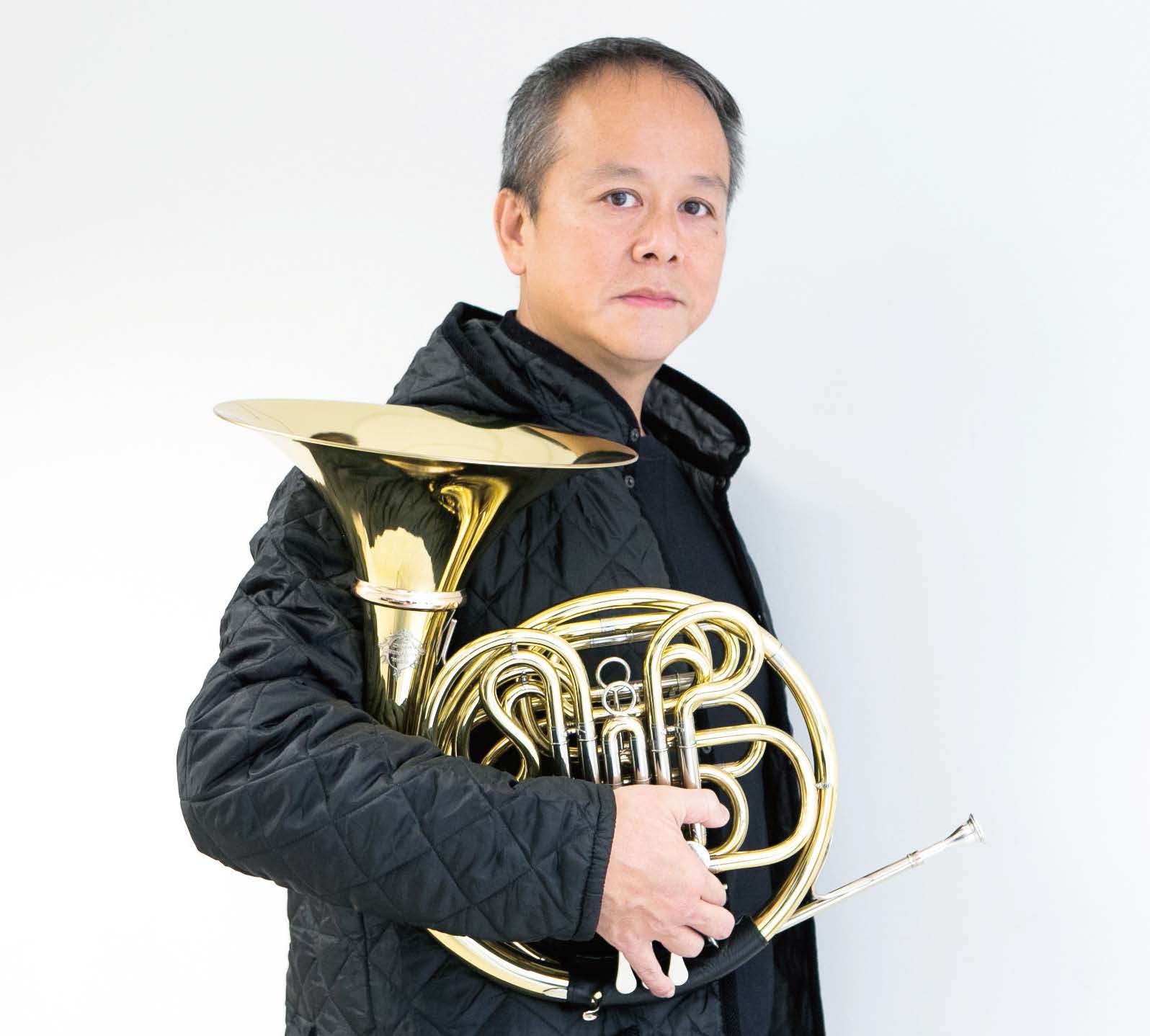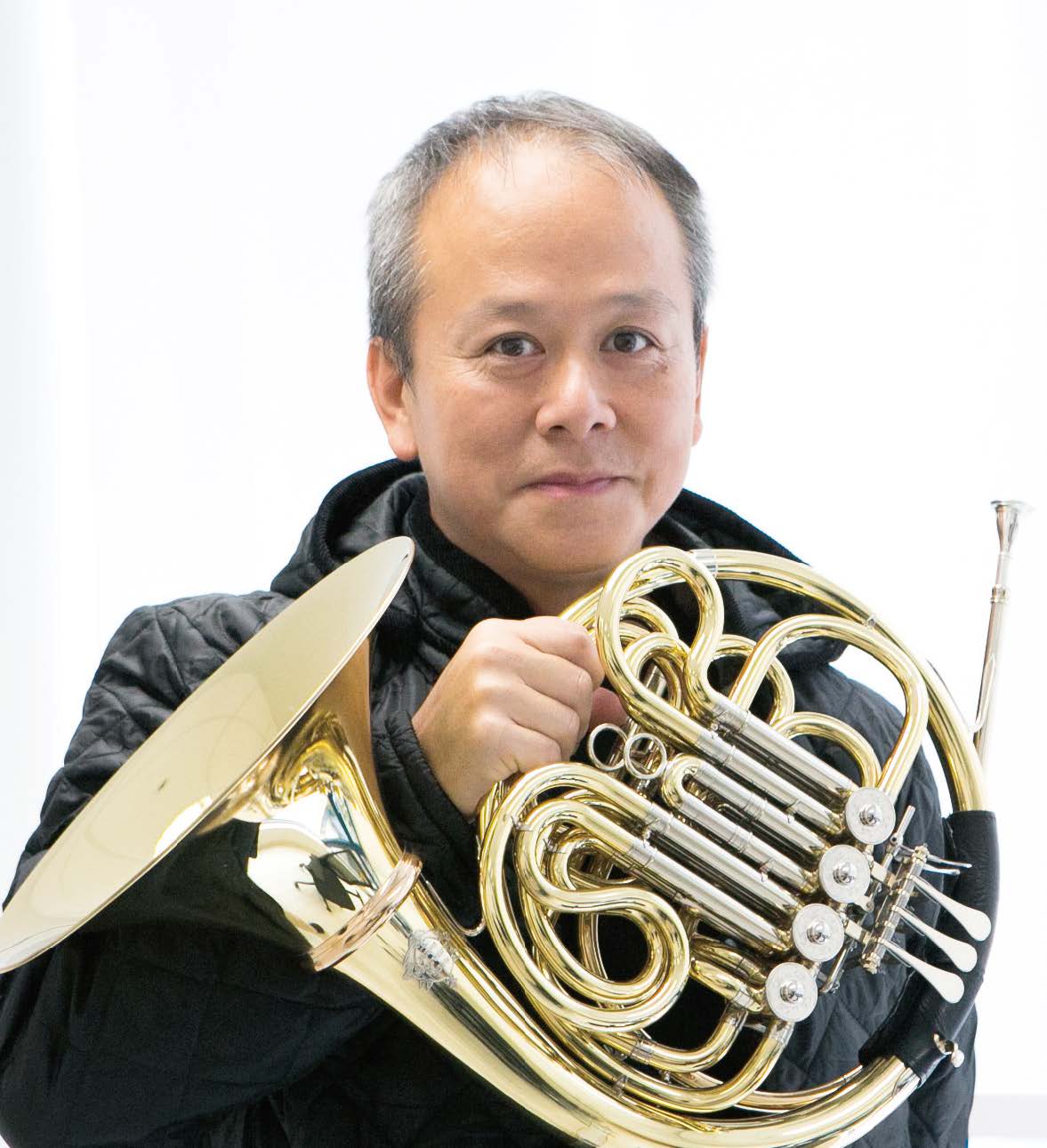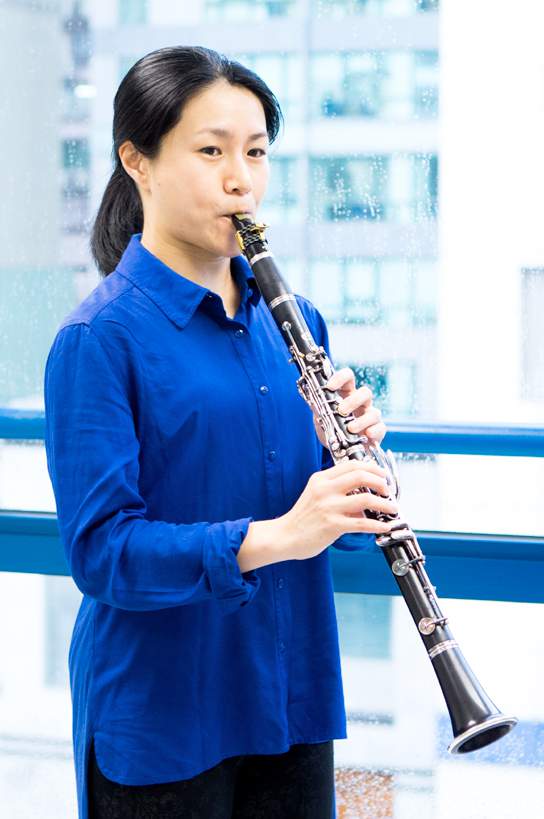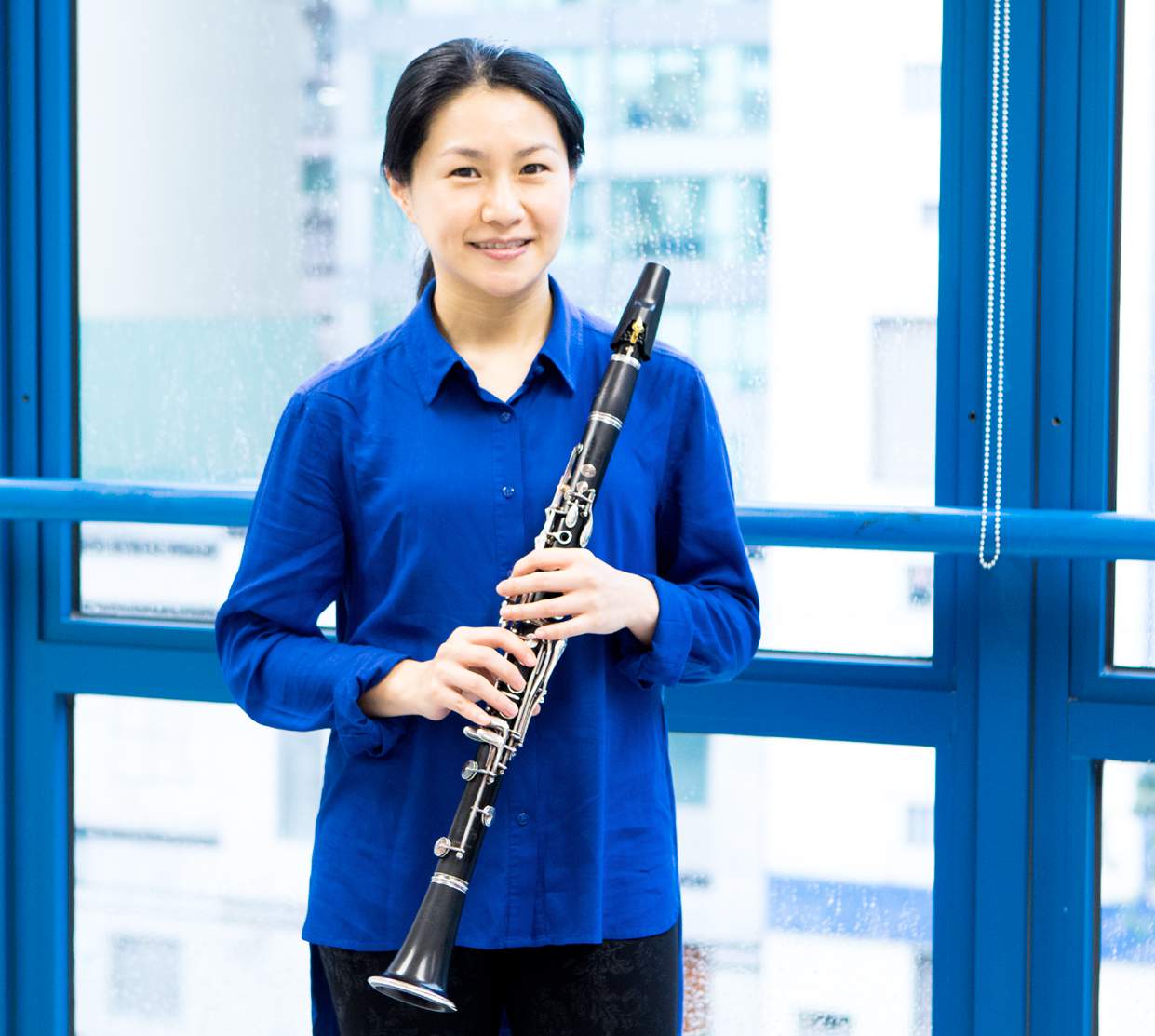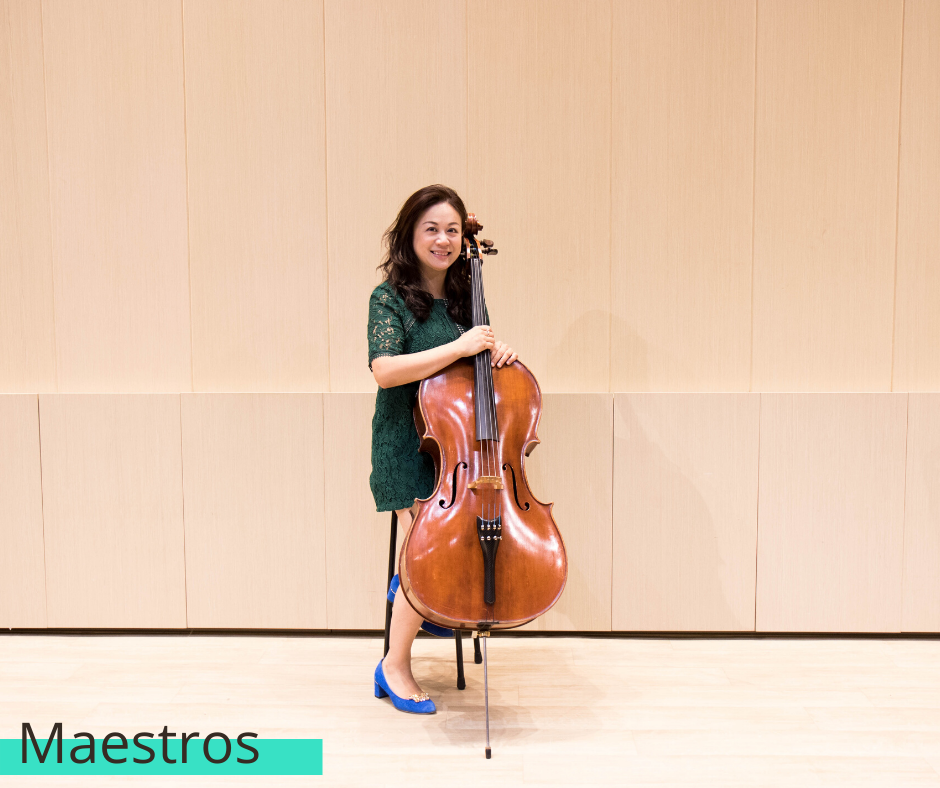A passion for music and music education #1 of 7
A passion for music and music education #7 of 7
June 2, 2020
We sit with accomplished musicians heading the CAIS Specialized Orchestral Training Program and ask them to take us to the beginning of their musical journeys, what inspired them, how they nurtured their passion and talent for music, their professional careers and what led them to teach music to others.
Violinist – Yu Sun
Vinod Khiatani (VK)
Yu Sun (YS)
 Could you share with our readers a little bit about yourself.
Could you share with our readers a little bit about yourself.
I started learning music very early at the age of 4. My grandmother sang in the choir and she also taught singing privately. She asked me if I would be interested in picking up an instrument just for fun and I picked the violin.
Any particular reason why the violin instead of other instruments say the piano?
There was a little bit of a music culture in our family. My uncle played the violin as an amateur and from a very early age, I heard him practicing and I was fascinated by the instrument. We did have an upright piano at home but I did not play the piano until I was about 15 years old. Looking back though, I think it is a pity I did not start playing the piano earlier as it is helpful when one learns different instruments later on. I studied with quite good instructors but I was not studying it(violin) professionally. It was more like an extracurricular activity. After 10 years, my teacher asked me if I would like to study it professionally because I was quite good at it but not top tier. I agreed with her and did the audition for the school but due to limited space and lots of violin players, I shifted to the viola instead even though my preference was the violin. After studying in the conservatory, I graduated and faced two choices. Do I continue and study the instrument abroad or I look for a job in China. I decided to go overseas and went to Spain. I studied chamber music (string quartet) for 1 year. I think chamber music was foundational for me to understanding how to work with others as a team. That one year was very important in my professional development. After that I went to Germany.
You have covered roughly 20+ years. I am curious though. You mentioned that your teacher asked you whether you wanted to study the music at the conservatory after 10 years. That is a long time. Take us back to the first year when you began learning the instrument. How was the instructor?
The beginning, the first year, for most kids who pick the string instrument, they do not make a nice sound. It is quite different from the piano where you tap on a key and the sound is nice. But for string instruments, it requires some patience. I think that the first instructor/teacher is even more important than the big professors in my later life. A good teacher in the very beginning is very, very important. How you hold the violin, what is the right posture, how you put the bow and how you make a good sound from the beginning, that is very important. I had a very good teacher. She was very good for beginners. She could not only explain from the instrument but she could explain things in detail and tell you what is right or not right. In most cases, she would encourage me to think actively/positively. The interaction is very important. I think my study was quite smooth.
Did you ever think about giving up after say 3-4 years and move on to other things?
I actually never thought of giving up even though I did have some difficulty. But I am not a person who gives up easily. I guess it is my personality trait. My parents also were not typical. They did not force me to practice.
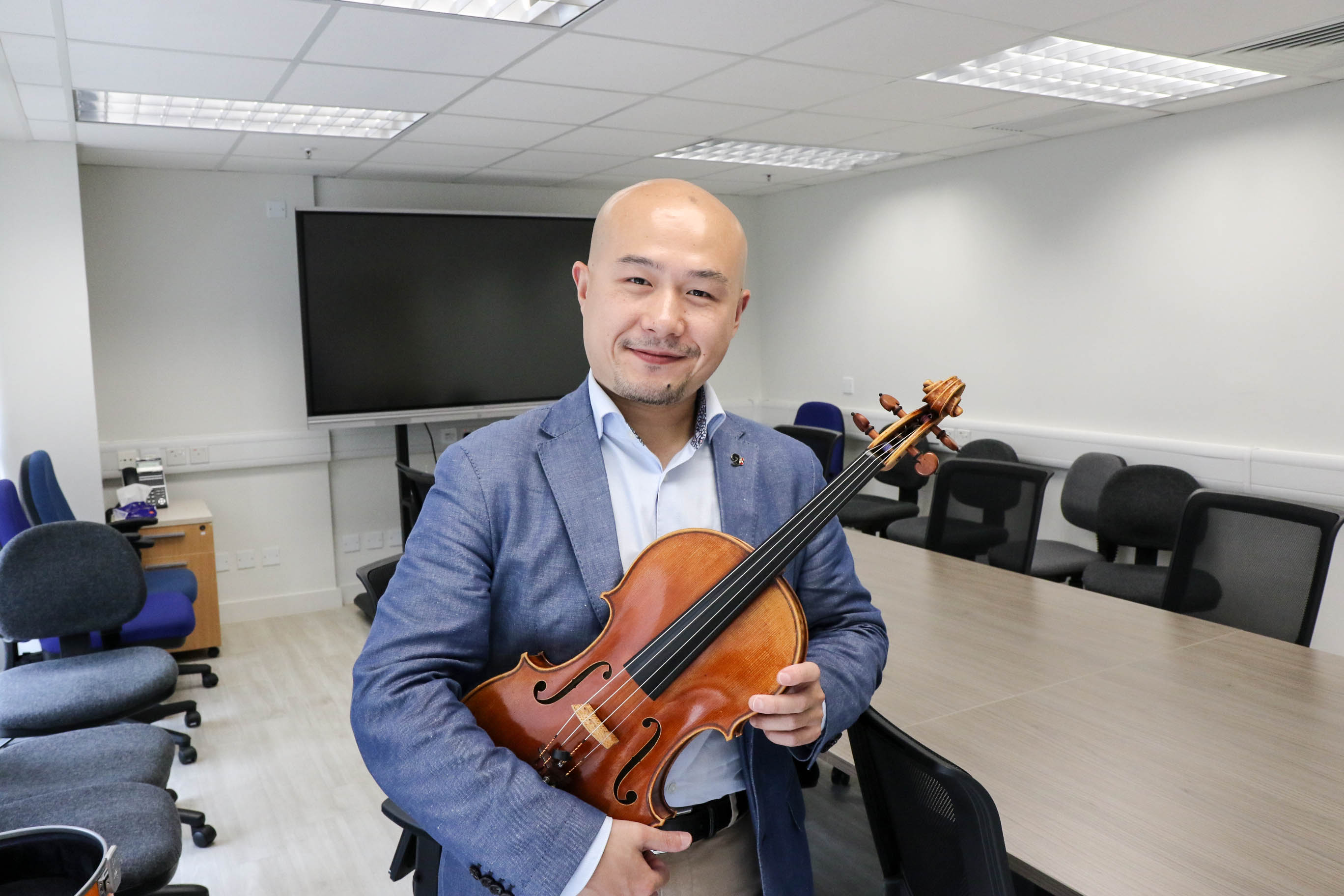 You mentioned that after the conservatory, you had to decide whether to go professional or look at other career options. Did you have any pressure from your parents to put aside music and work towards a “real” career?
You mentioned that after the conservatory, you had to decide whether to go professional or look at other career options. Did you have any pressure from your parents to put aside music and work towards a “real” career?
I actually did not face any pressure from my parents. My mother supported me a lot and encouraged me to continue studying music. I think it was while I was in the conservatory that I enjoyed music even more. The environment was very good. To be honest, when you are a student, you do not think that far ahead. I didn’t think that far ahead. I just wanted to make my playing better and back then, the Shanghai conservatory started inviting foreign musicians to teach master classes and they actually opened my mind alot. They spoke about background, culture and other kinds of arts. I didn’t know any of that and it raised my interest to go to Europe because that was the origin of classical music. Finances were also a consideration. My parents were not so well to do but studying in Spain and Germany were fully funded by the state. In Germany, there were many outstanding instructors. During my first year of study, I was asked by my professor to submit my application for audition with the Berlin Orchestra. I didn’t think my chances were great but I submitted and I was selected. That was my first orchestra experience. I am grateful that I was exposed to some of the world most renowned musicians and conductors. It was an unforgettable experience.
When did the desire to teach the instrument begin?
In my very first lesson in Berlin, I played for my teacher and she said to me “you will be a very good professor in the future”. I didn’t say a word to her in this regards but she arrived at this conclusion on her own. When I taught mass classes at the Shanghai Conservatory, I realized that my teacher was right. I learn things fast and explain them well. When I see my student making progress, there is a satisfaction I sense that is even better than the satisfaction I get from my performance. When I was playing with the European Orchestra, some students would ask me to instruct them on the fine points of playing. Later on, I was invited to actively participate in the Asian Youth Orchestra based in Hong Kong. The AYO is in its 28th year and I became the viola teacher. for about 3 years (3 seasons). Every summer, musicians from all over Asia come for a 1 month intensive training followed by a performance tour. Last year was the World Tour visiting America, Berlin, Vienna etc and this year was the China Tour visiting cities in Mainland China, Philippines, Japan and of course Hong Kong. It was a very good experience in how to work with young emerging musicians.
Is there a particular age group that you find yourself particularly effective with or that you connect better?
I think working with different age groups requires different approaches. I enjoy working with young kids a lot because they are like blank paper. If the kid has interest in making music, then we can develop much faster. I do also enjoy working with semi-professional musicians. But you are right; I adapt my methods with different learners.
What do you look for in a student say between the ages of 6-11?
I think it is too early to look for long term commitment from students whether they want to play for life as a career choice. But having said that, the first thing I want them is for them to like what they are doing. I want them to (without any compulsion) to pick up the instrument to play. The second thing I am looking for is that they are beginning to build their taste in art and culture. So even if they do not play the instrument when they go up, they would have developed their taste in artistic culture.
You mean cultivate the aesthetic sense in them?
Exactly.
How can parents help in fostering the interest of music in their child?
Before they start playing any instrument, I would encourage them to listen to others play the instrument. Hearing and seeing are better avenues for learning than telling them, so I advise parents to take their children to live concerts, or play some good classical music CDs at home. Classical music has a very rich heritage and exposing them to the music facilitates their emotional development at an early age.
Is there an ideal age to begin or it doesn’t really matter?
In my view, I think age matters. If you start at say 15 or 16, the skill development is slower. I think at a younger age, the muscle memory and brain development are given more time to develop. I think the ideal age range would be between 4-10 years. Of course everyone can ultimately learn to make
sound, but it just depends what kind of sound.
Have you noticed any transferable skills that you developed while learning to play the instrument to other aspects of your day to day living.
When I played in Chamber music and later in Orchestras, I learned some valuable skills. I learned how to put my ego aside and think subjectively from the other participants ‘perspective. Everyone has a perspective but if I only insist on my perspective, I will not develop further. I think another valuable skill was to develop the habit of listening to others to facilitate positive dialog. Those are the skills that have enriched other areas of my life outside music.
A passion for music and music education #6 of 7
A passion for music and music education #6 of 7
June 2, 2020
We sit with accomplished musicians heading the CAIS Specialized Orchestral Training Program and ask them to take us to the beginning of their musical journeys, what inspired them, how they nurtured their passion and talent for music, their professional careers and what led them to teach music to others.
Percussionist: Rieko Koyama
Vinod Khiatani (VK)
Rieko Koyama(RK)
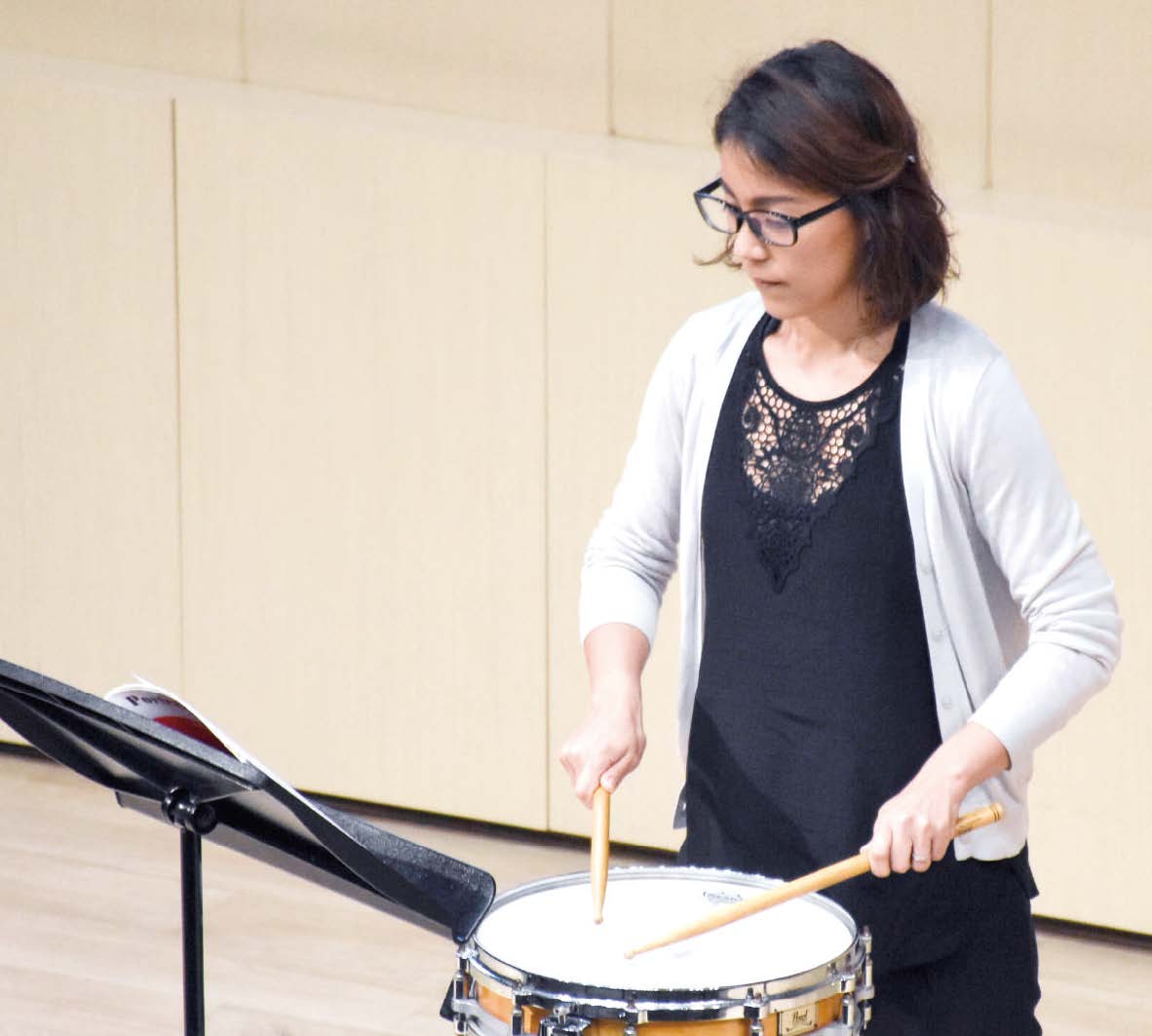 To start off, we thought our readers would be interested in how the journey began in Japan and ended in Hong Kong. Could you share with us your journey please?
To start off, we thought our readers would be interested in how the journey began in Japan and ended in Hong Kong. Could you share with us your journey please?
Yes, my journey began when I joined the marching bandin my primary school as an after school activity (in Japan we called them club). I was a very active young girl and the position of playing drums while moving appealed to me. I played and thoroughly enjoyed it. We practised for 2 hours every day after school and entered into competitions. But then they did not have the marching band in middle school so I just practised the drums on my own until high school when I joined the marching band again. In high school, my teacher showed a video of high school marching bands in America. I was fascinated by the level of creative movements and skills and wanted to pursue it more. At that time, my school also had a sister relation with a school in Canada and I approached my teacher to ask if I could go to Canada and join the marching band there.
So that ended the phase in Japan and led to the next phase in North America.
Exactly. I was in Canada for about 2 years and then auditioned to join a marching band in California and was selected. I was with them for about a year as they had a age limitation policy and I had reached it. Up to that time, I was involved in marching bands more out of interest but I thought seriously about what I wanted to do and thought it would be good to pursue music formally. The other option was to be a band instructor in a school back home and I wasn’t drawn to that option. So I did my Bachelors and Masters Degrees in music between Universities in Indiana and Boston. That was when I became involved with orchestral playing and performance.
Then you moved to Hong Kong?
No, I moved back to Japan first as there was an opening for orchestral training instructors to teach the younger generation and foster in them an interest in orchestral music performance. It was a 3 year commitment after which you were on you own. In the meantime, I was encouraged to audition for position in openings around the world.
Tell us something about these auditions?
They are very competitive and for every single position available, there can be a min of 10 auditions if the orchestra is small to a hundred if it is a fairly large orchestra. I can only describe the process as stressful. You submit your resume and if you are shortlisted, you are invited to play live and the pool shrinks until they (the interviewers) find the perfect match. It is a daunting experience and in my case, I was more desperate as I wanted to land a position after my 3 years in the Japan was done. And that is when I secured the position with Hong Kong Sinfonietta and I have been here since 2011.
I am curious what factors do they consider in auditions?
I would think experience and your live performance would weigh heavily. But to be shortlisted, perhaps you music education also play a factor.
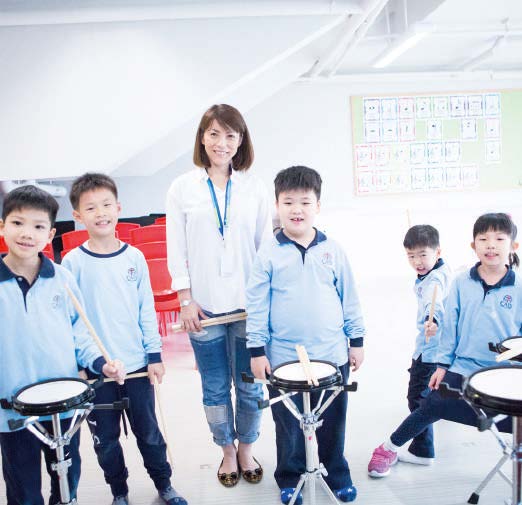
So how did you get into teaching?
I thought that perhaps I should broaden my skills set and try teaching but it was difficult in the beginning. In Hong Kong, we you are teaching violin or piano, there would be a ready demand as parents seem to prefer these instruments but percussion instruments were not so popular. So I decided to start small and worked with toddlers age 3 and above through music movement classes. That became popular and I move on to make curriculum for age 4 and above and it kept growing. I found myself enjoying the experience of seeing children explore music and take interest in it. In Hong Kong I think that parents want their children to cultivate their creativity and they look to music and art to help cultivate it but sometimes the decision is then imposed on the child. In Japan, when I was growing up, parents then to be more laid back and allow the student to explore various avenues and let the interest be self-initiated. In a small measure, I am trying to cultivate self-interest among student here.
How can a parent foster that interest in their children?
I would say that the most preferred and fruitful avenue is to take them to live concerts. Sure they can listen to music on their devices or play their DVDs on the best sound systems but nothing compares to a real live concert. It gives them a different level of appreciation and would likely spare their interest in learning a musical instrument.
A passion for music and music education #5 of 7
A passion for music and music education #5 of 7
June 2, 2020
We sit with accomplished musicians heading the CAIS Specialized Orchestral Training Program and ask them to take us to the beginning of their musical journeys, what inspired them, how they nurtured their passion and talent for music, their professional careers and what led them to teach music to others.
Oboist/ Bassoonist – Kevin Lee
The Clown of the Orchestra
“The bassoon is one of the most difficult instruments in the orchestra to play but its role is vital”
“The instrument itself looks like a bedpost”
“The bassoon has become familiar, in anatomical terms, to the human appendix”
“The tone of the music is so companionable, so delightfully talkative, so attuned for every pure soul that until the Day of Judgement, the bassoon can never be dispensed with. It assumes all roles: it accompanies martial music with manly dignity; it is heard majestically in Church; it sustains the opera; it reasons with wisdom in the concert hall, gives a swing to the dance and fulfills every requirement” (Poet C.F.D.Shubert d.1791)
At least that is what my research – the bassoon had a fascinating history. Why would someone decide to play it for a living? In this interview, I talk with Kevin Lee who plays the bassoon and oboe professionally and asks him to share with our readers how he got started on his musical journey.
Vinod Khiatani (VK)
Kevin Lee (KL)
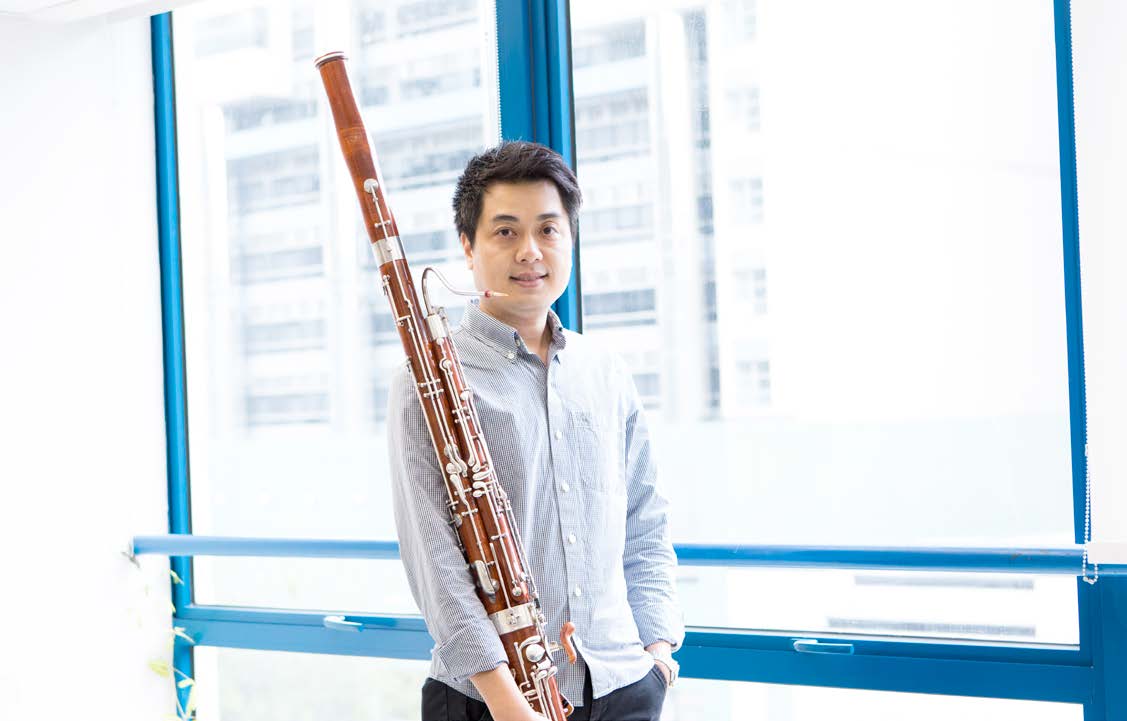 Let’s start from the beginning. I’ll be honest – I didn’t know what a bassoon was until I looked into it and I must say it has an unusual history. The remark I thought most interesting was the bassoon was the “clown of the orchestra”
Let’s start from the beginning. I’ll be honest – I didn’t know what a bassoon was until I looked into it and I must say it has an unusual history. The remark I thought most interesting was the bassoon was the “clown of the orchestra”
It is true, I think, It is the most misunderstood. It may seem like it is not necessary. It has this awkward shape and it is a large piece of the instrument but it plays a vital role in the orchestra. In fact, every orchestra would have at least two or more bassoon in it. It is the bottom part of the wood wind family.
How did you get started? I can’t think of any student at a young age who would say I would like to play the bassoon.
I did not start out with the bassoon. I started out at age 6 playing the violin but after a year, I gave up. I found that the posture to play the violin to be too awkward for me so I gave up. At age 9, I had the desire to pick up some instrument and two choices were before me – the bassoon or the saxophone.
My family has always loved music and if we were not going to concerts, we were listening to classical music at home. My mother gave me an advice I thought was very profound. She told me that the saxophone has a rude personality while the bassoon was shy and quiet nature more aligned with my personality. And besides if I learned the saxophone, I would not play in an orchestra but if I played the bassoon, I could have the opportunity to play in an orchestra if the opportunity presented itself.
In almost all of our interviews in this series, mothers played a pivotal part in fostering the child’s lifelong interest in music. Is that the career she envisioned for you?
I don’t know but I listened to her and chose the bassoon. My teacher who taught me was a wonderful teacher. He was always encouraging me and praised my efforts. Through his guidance, I was directed to apply for DBS. Now my academics were not exceptional but DBS had an orchestra but they need a bassoon player. My instructor said that I played well and if I applied, I could get in on the basis of my strength. So I applied and got into DBS and played in the orchestra. I enjoyed the inter-school competitions very much as it helped me improve.
So did you study music at University after graduation?
No, I graduated from DBS and went off to the UK to study Business and Management. But my academic foundation was not strong and I struggled in my studies. I decided to take lower form 6 again but no matter how hard I tried, my academic results were not improving.
What did you do next?
I was also attending a church while I was there in Brighton. I was also playing the bassoon on and off with a group and we would play at different venues. There was a lady that came up to me and asked whether I had considered playing the bassoon for a living. She had heard me play in the group and felt that I played it well and that was my strength and that I should concentrate on building my career on my strength. At that moment, a light bulb went off in my head. Why hadn’t I taught of that? It brought back to my mind the
words of my instructor when he encouraged me to apply for DBS.
So she accompanied me to look for a University that would accept me but I did not finish my A-levels so I was not sure that I could find one. But she persisted and we found a University that accepted student via audition only. I went for the audition and played my favourite piece and after I was done, the admission director extended his hands and said I was accepted. I have often looked back and marveled at God’s guidance in this.
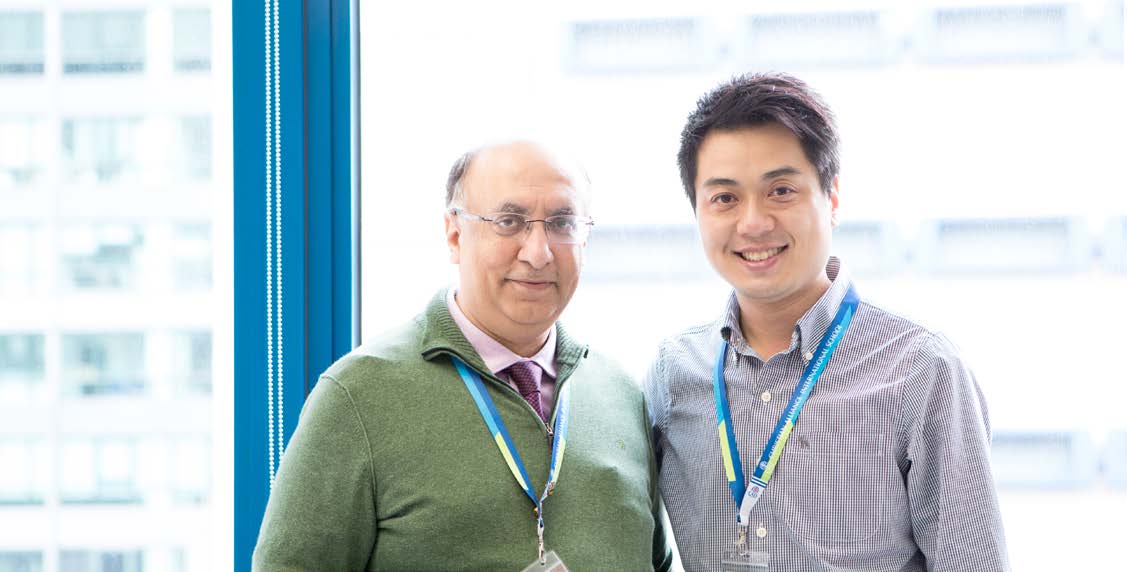 What were your parent’s reaction to all this?
What were your parent’s reaction to all this?
They were very supportive and encouraged me to persevere. I went through the three-year program without any difficulty. After that, I did my post-graduate diploma of music from the Royal Birmingham Conservatoire and then came back to Hong Kong to play and teach.
What do you look for in your students?
I look for students who are eager to explore new things, have a goal in mind, are willing to accept responsibility and will finish what they start. I want them to love music for music sake and not because it would be a means to get ahead in the education competition.
What kind of music do you enjoy listening to? And what advice would you have for parents?
I enjoy music in general and listen to all kind. For parents, be supportive and observant of your child’s unique personality. Build on his strength but don’t force your aspirations on them. Prepared them for the journey.
A passion for music and music education #4 of 7
A passion for music and music education #4 of 7
June 2, 2020
We sit with accomplished musicians heading the CAIS Specialized Orchestral Training Program and ask them to take us to the beginning of their musical journeys, what inspired them, how they nurtured their passion and talent for music, their professional careers and what led them to teach music to others.
Flutist – Izumi Nikaido
Vinod Khiatani (VK)
Izumi Nikaido (IN)
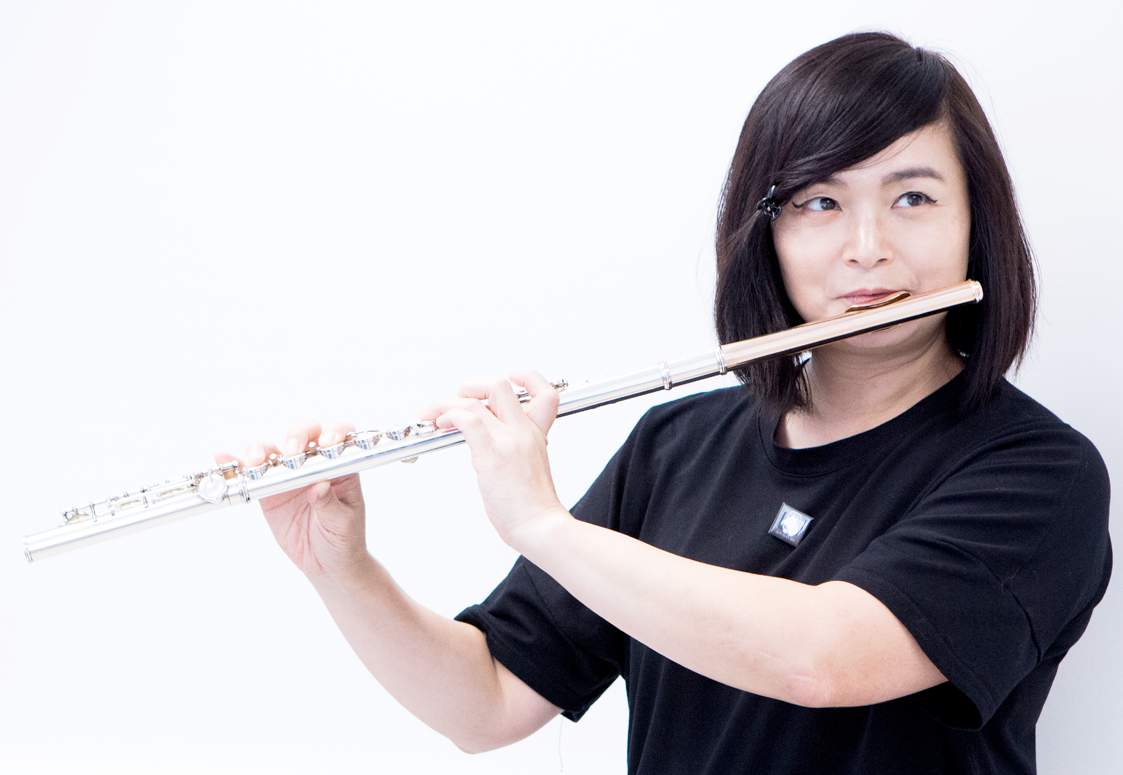 Could you give our readers a brief introduction of yourself?
Could you give our readers a brief introduction of yourself?
I am Izumi Nikaido and I am a flutist. I was born in Kagoshima City, Japan and started to play the piano when I was 3 years old. At 11, I taught myself to play the Piccolo. I studied in Kagoshima Junior College, the Royal Academy of music, the Hong Kong Academy of Performing Arts, and Lécole normale musique de Paris. I was the assistant principal flutist for the Guangzhou Symphony Orchestra, acting flute/ piccolo of Hong Kong Sinfonietta and currently a free-lance orchestra/ensemble flute player and educator.
You are very cosmopolitan – Japan, China, U.K., Hong Kong…Let’s go back to the beginning in Japan. You started with the piano and switched to the flute, how did that happen?
I started playing the piano mainly because my mother played it and I was curious about it. My mother enjoyed a wide variety of artistic endeavors and I naturally enjoyed the musical expression I was growing up with. Actually, I did not start playing the flute but started with another instrument called the piccolo. It was during a visit to hear an orchestral piece that my attention was drawn towards the sound of this interesting instrument. I loved the sound so much that I asked my father to buy me a piccolo. So at the age of 11, I started playing the piccolo learning it by myself. It wasn’t until much later that I was advised by a teacher that I should learn how to play the flute first as that is the proper sequence. So I switched to studying the flute.
So how did you end up in the UK?
My parents have always been very supportive of my interests. When I graduated high school, I had a choice of either going to study at a University in Tokyo or study in a junior college for 2 years and then go abroad for the next 2 years. I was captivated by the idea of expanding my horizon so I opt for the 2-year college in Japan followed by the overseas study. Initially, I went to U.K. to study English as I felt I need to improve my language ability before I can enroll in a music school.
Why not the USA instead?
My father who was a journalist by profession suggested that America would not suit my personality as I am not competitive by nature and he felt that I would not gain much due to my shyness. I agreed with his suggestion and since I enjoyed rock music, I thought it would be better to go to U.K. instead.
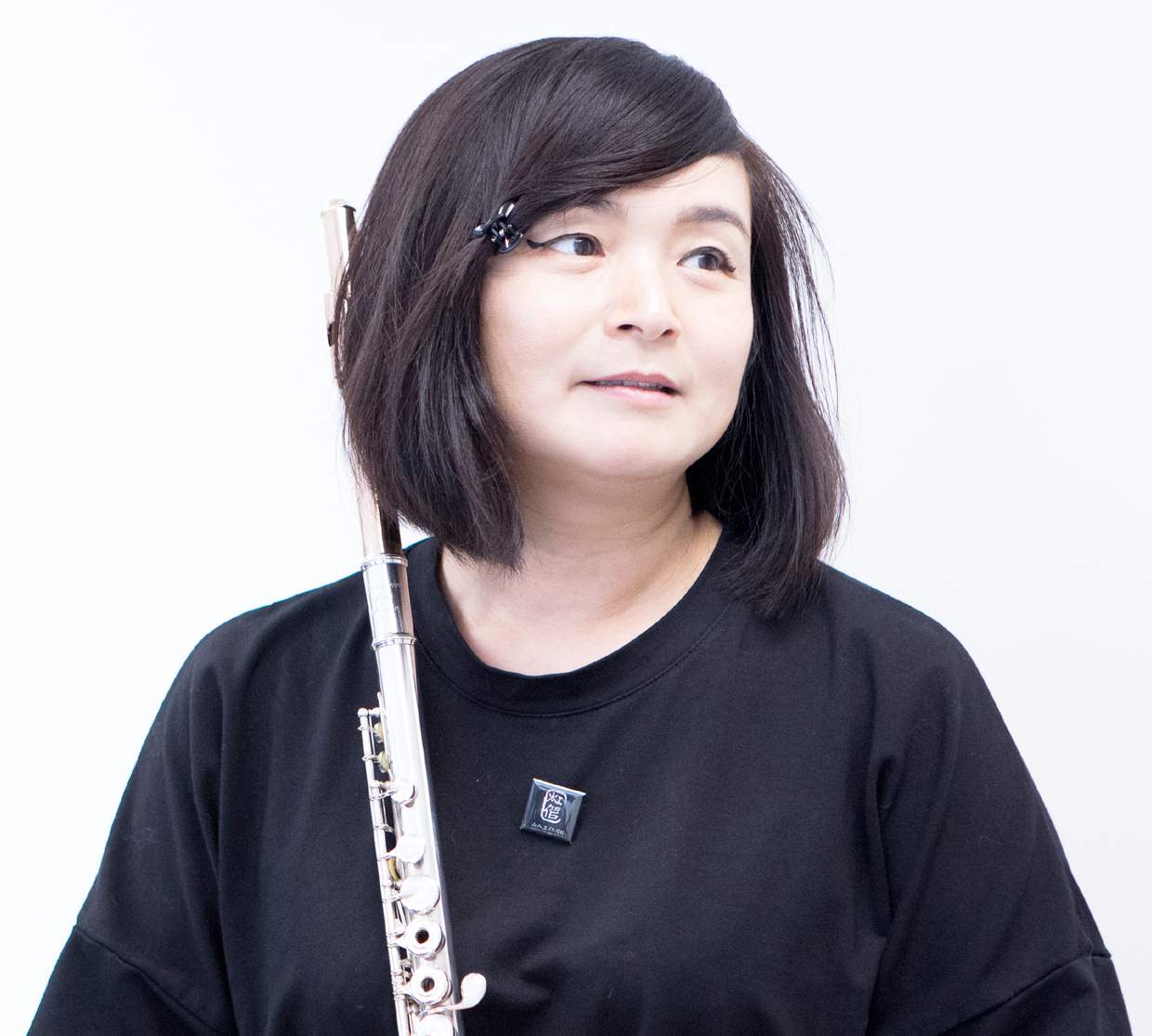 How did you end up in Hong Kong?
How did you end up in Hong Kong?
I was in London studying English and I visited the Royal Academy of Music to hear a master class. I was once again intrigued by music and decided to pick up the flute again.
So I enrolled in the Royal Academy for 1 year. After that, my father suggested that perhaps it is time to come back home except home this time was not in Japan but in Hong Kong as he was posted to Hong Kong. My teacher in U.K. wanted me to stay in U.K. and continue my training but seeing that it was not going to happen, connected me with a teacher teaching at the Hong Kong Academy of Performing Arts. I wrote to them and after the interview and auditions, they agreed to accept me as a student and that is how I ended up in H.K. I studied at HKAPA for 2 years. Then I left for Paris as I was fascinated with the French form of music and enrolled myself at the lécole normale musique de Paris for 2 years. Then back to H.K. followed by playing flute for the Guangzhou Symphony Orchestra until 2006, then back to H.K. to play for the Hong Kong Sinonietta. And I have been here ever since.
So how long have you been away from Japan?
It would be about 30 years counting the time I was in U.K., Paris, Guangzhou, Hong Kong.
Besides teaching wmusic, what other activities are you involved in?
I do some recording for music videos; play in an ensemble that toured last year. I also play the keyboard in an indie Reggae band called Sensi Lion. This year we played at the Clockenflap –Indie Music festival here in Hong Kong. I am also learning dancing (ballet) and taking care of my pets (1 cat, 2 dogs). The cat has been with me since my stay in Guangzhou and the dogs were adopted here in Hong Kong.
A cat all the way from Guangzhou?
Yes (laughs) from Guangzhou so she is quite old now. The cat was the reason I did not go back to Japan but came to Hong Kong instead. If I had taken the cat back with me to Japan, the cat would have to be quarantined for at least a few months (180 days). But in Hong Kong, the quarantine time is much shorter. So I decided I could not stay away from my cat for so long therefore I came to Hong Kong.
You mentioned that your mother was a great source of inspiration and support for you – she was a professional dancer and still teaches dancing. Do you dance?
Lately, I have been learning different forms of dancing including ballet. I love learning new things and I try to explore many different artistic endeavors. I think that because if it helps me greatly to relate to my students better as I can understand what they are feeling when they try to learn something new and challenging. If I do not try new things, I feel I cannot connect with them when they are frustrated and would, therefore, quit learning.
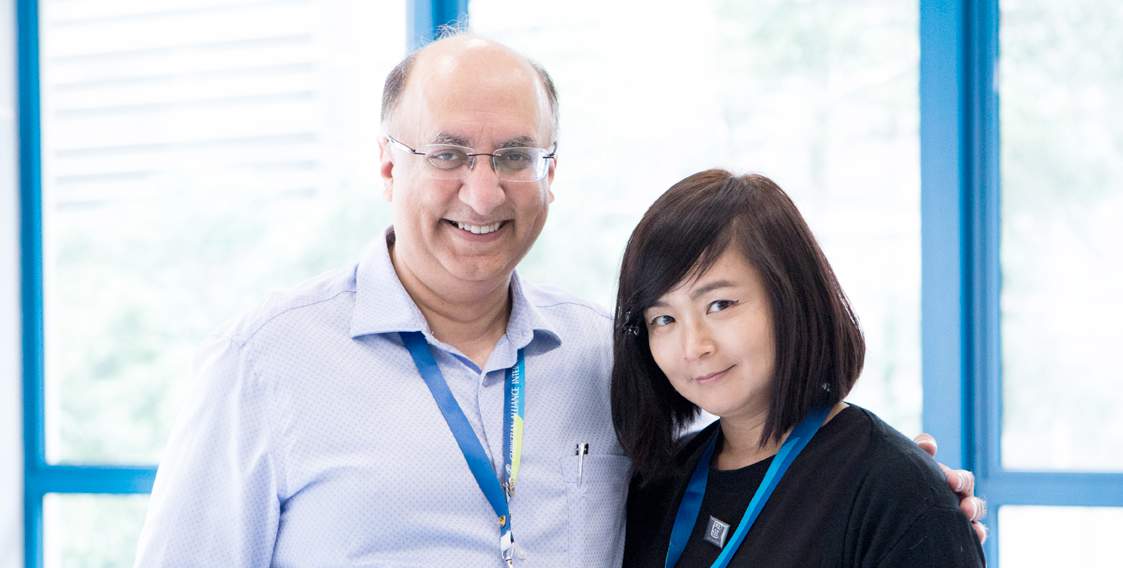 How do you motivate your students?
How do you motivate your students?
Learning to play an instrument and read the score if you are learning to play classical pieces is definitely not easy. It is important to practice and get the finger positioning correct and many other technical details but I focus on the experience each one of my students has when they are learning the instrument at that moment. I want them to be in a happy emotional state when they are engaged with the instrument. This way the discipline to practice comes from the heart within. I also try to emphasize their strengths – what they can do and are doing correctly and use it to compensate for their weakness. Usually, in about three months’ time, I would say they are able to hear, play and appreciate some beautiful songs and that motivates them to learn more.
A passion for music and music education #3 of 7
A passion for music and music education #3 of 7
June 2, 2020
We sit with accomplished musicians heading the CAIS Specialized Orchestral Training Program and ask them to take us to the beginning of their musical journeys, what inspired them, how they nurtured their passion and talent for music, their professional careers and what led them to teach music to others.
Hornist / Trumpetist – Chi-chung Chow
Vinod Khiatani (VK)
Chow Chi Chung (CCC)
Let’s start with early influences in music training.
Sure. I was 7 years old when I started playing the Horn. Actually, I did not choose the instrument nor did I come from a musical family. The Hong Kong Government wanted to develop the interest in music among youth and started an initiative to scout for students from local schools that they could gather and provide quality music instruction. They came to my school and interviewed me and suggested that I try the Horn. And I did and enjoyed the experience and stuck with it. It was not tied to my school in any way but I was glad for the opportunity. I was able to travel to different countries with the team and thoroughly enjoyed it. At 14 while I was in middle school, the Hong Kong Academy of Performing Arts (APA) had just opened its door and I was selected to join in their Junior Program. They were looking for talented students and by that time, I had spent several years playing the Horn. When I graduated from High School, I enrolled in the Senior Program at APA and spent the next 4 years there. In 1993, I was recruited to be the associate principal Horn for the Korean Symphony Orchestra which is under the Korean Broadcasting System. In 1995, I became the youngest principal Horn player in the orchestra. It was a wonderful time and I spent 7 years in Korea until I was recruited to play in the Guangzhou Symphony. After a year there, I came back to Hong Kong and played with the Hong Kong Sinfonietta followed shortly by the Hong Kong Philharmonic where I am to this day.
It seems like you were always in the right place at the right time.
Yes, it seems like it. The common theme in the early years was all the institutions that I was associated with were just beginning to form and grow and they needed a Horn player and I was available so I was recruited. I enjoyed these start-up experiences until I returned to Hong Kong. Here the effort to develop talent had taken off and Hong Kong boasted a well-developed musical culture. At that time, I was married and wanted to settle down preferably in Hong Kong. So I came back and waited for the opportunity of an opening with the Hong Kong Philharmonic. It has always been my dream job. There was a worldwide audition for talent to join the Philharmonic and I auditioned for the position. I was happy with my performance and I thought at that time that if the Philharmonic did not choose me, it would be their loss. I was just confident that I had done my best and I was overjoyed when I was notified that I was selected. I have been there ever since.
And you have only played this one instrument throughout?
Yes, I didn’t know anything about musical instruments and may be given the choice, I would have chosen to learn the violin as that is the popular choice among parents in Hong Kong. But when the Hong Kong music office interviewed me, they carefully observed my physique, my height, weight and even my lips and concluded that I will learn to play the Horn. So I did. Incidentally, I did not know at that time but this particular instrument has the reputation of being the most difficult instrument to play in the orchestra which explains why the demand to find a player was so high and the players so few. For example, in the Korean Symphony Orchestra, I was the only external candidate recruited to play the Horn while all the other players were Korean.
What lead you to teach?
Teaching also came naturally. I thought that there may be students who do not know exactly what they want to play but I could help them develop an interest in music and if they keep at it, they would stand out. I did not start with a passion and pursued it but rather I allowed the passion to develop after I started getting good at it.
That is a good message for our students to read that passion develops as we become competent in our skills.
A passion for music and music education #2 of 7
A passion for music and music education #2 of 7
June 2, 2020
We sit with accomplished musicians heading the CAIS Specialized Orchestral Training Program and ask them to take us to the beginning of their musical journeys, what inspired them, how they nurtured their passion and talent for music, their professional careers and what led them to teach music to others.
Clarinetist – Chiu-yuan Chen Clarinetist – Chiu-yuan Chen
Manson Tam (MT)
Chiu-yuan Chen (CYC)
Can you tell us a little about where you grew up and your early musical training?
I was born and grew up in Taiwan. When I was a child, my mother strongly encouraged my two sisters and me to learn playing piano. One day she discovered that I was able to play all the pop songs without music notation and realized that I was good at the sensation of tone. Then, she invited a piano instructor for me to enhance skills. Besides, I attended in the special music class playing piano when I was studying in secondary school. In the meantime, I was also interested in playing clarinet and chose this instrument’s course as the major in the National Taiwan Normal University.
After graduating from National Taiwan Normal University, you went to New York to study contemporary music – what led to your interest in the US?
When I graduated from the Bachelor degree program, I originally planned to be a secondary school teacher. At that time, I joined with my classmates to participate in a number of auditions in the US and see any new opportunities that fit me the best. Eventually, I obtained a scholarship for study in New York. Therefore, I spent five years in “The Big Apple” and received a Master of Music from Juilliard School and a Doctor of Musical Arts from City University of New York right before moving to Hong Kong. I have been one of the members of Hong Kong Sinfonietta since that time.
Was there a particular teacher or mentor in clarinet or composition that you sought out in Taiwan, US or Hong Kong? Did he/she bring any influence to you?
There are a number of teachers and mentors I came across. But who has brought me the most impact in my music journey? I would say the answer is my mom. Walking toward a musician is always difficult and has to spend much time or even money, but she has been backing me up since the day
one. No matter which path I chose, she had never voiced reservations. So she is an important person in my music journey.
You are now teaching in HKAPA and CAIS. How did you get into teaching?
I used to teach in HKAPA. However, the number of students decreased in the current academic year. I am not teaching there at the moment. As I love music and know the importance of learning music at the young ages, I truly enjoy every moment in the music classes with students. On top of CAIS, I am now teaching in several local schools as well.
Do you have any advice for children who are interested in music?
Practice, practice and practice. Practice is the process of getting closer to achieving your musical goals. When we practice, we take elements of our playing that we find difficult, and play them carefully until they are easy. Once what you are practicing becomes second nature, playing your instrument becomes a lot of fun. Before you get to that stage, you will find it takes a lot of hard work and concentration.
Regarding how often should you practice your instrument if you are a beginner? There are no rules when it comes to music, and there are no rules when it comes to practicing music. What we have instead are good ideas that have been proven over many years to help you become a better player.
One of these ideas is that small amounts of regular practice is much better than a massive session in the weekend. When you practice, you develop muscle memory. This is where you learn to do the movements without having to think about them. If the only time you play your instrument is during your lesson, then your muscles will have trouble remembering what they did during your last lesson and you will not make much progress. Music is very fun when you are making progress.
Like me, besides being a musician, nothing else I wanted to strive for when I was a young student. So I kept practicing every day.
A passion for music and music education #1 of 7
A passion for music and music education #1 of 7
June 2, 2020
We sit with accomplished musicians heading the CAIS Specialized Orchestral Training Program and ask them to take us to the beginning of their musical journeys, what inspired them, how they nurtured their passion and talent for music, their professional careers and what led them to teach music to others.
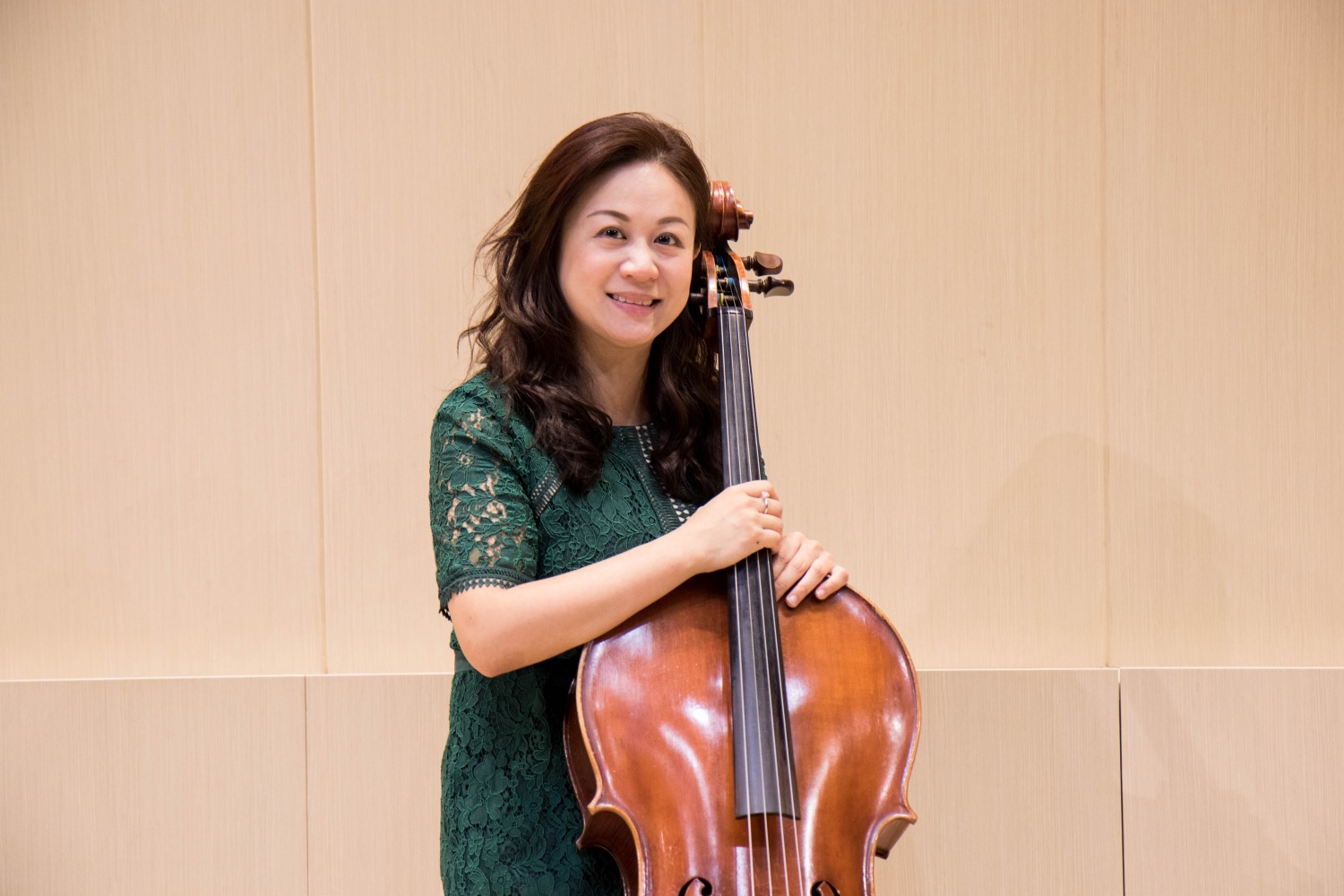 CELLIST – ANNA KWAN TON-AN
CELLIST – ANNA KWAN TON-AN
She is an acclaimed young virtuoso of the new generation started learning the cello when she was ten at the Hong Kong Academy for Performing Arts.
She received her Bachelor Degree at Oberlin Conservatory of Music and obtained her Masters of Music at Yale University.
Anna has worked with members of the Vermeer, Emerson, Colorado and Tokyo String Quartets. In 1992, she was chosen to be the only representative from Hong Kong to attend the Interlochen Arts Camp in Michigan, the USA with a full scholarship. She was principal cello of the Asian Youth Orchestra in 1995 and a member of the Jeunesses Musicales World Youth Orchestra, orchestra in residence of the Verbier Music Festival, Switzerland in 1996 and 1997. Anna also toured with the Yale Cellos, performing at the Manchester Cello Festival and Rencontre de Violoncelles in Beauvais, a CD of the concert was released for Calliope record label. Anna joined the Hong Kong Philharmonic Orchestra in 2001. In 2006 she was invited by Maestro Myung-Whun Chung to perform as a member of the Asia Philharmonic Orchestra to perform in Seoul, Korea.
(Brief excerpt from Hong Kong Chamber Music Society)
Vinod Khiatani (VK)
Anna Kwan (AK)
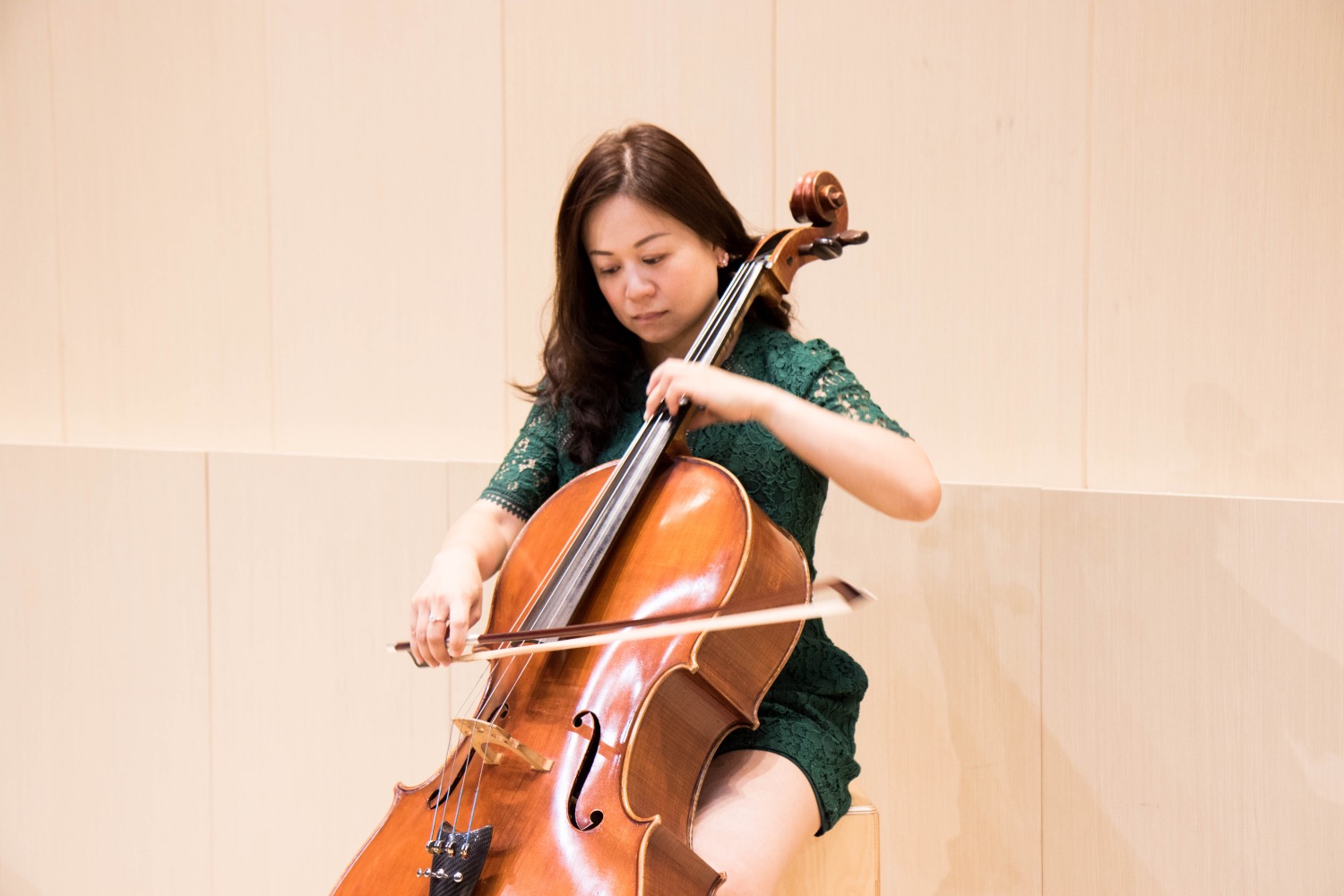 You started studying cello at the age of 10 at the Academy of Performing Arts. Why is that the instrument you chose? Were there any other instruments you played?
You started studying cello at the age of 10 at the Academy of Performing Arts. Why is that the instrument you chose? Were there any other instruments you played?
I grew up in a musical family. My mother taught the piano when I was young. She had studied the piano in England and my brother was also playing the piano. At the age of 4, my mother arranged for me to learn the piano. I was fond of music and picked up the violin also. My mother also took us to the concerts and it was in one of the shows where I saw the famous cellist YoYo Ma playing that I decided I too want to play the cello. I grew up playing all 3 instruments but when I was accepted to the Academy of Performing Arts, I was advised to focus on playing one instrument and I chose the cello.
What memorable experience do you have during this time in your musical journey?
A definite highlight was when I was chosen to be the sole representative from Hong Kong at the Interlochen Arts Camp in Michigan, U.S.A. It was an 8-week camp but I thoroughly enjoyed every moment that I was there.
You have a history with the Asian Youth Orchestra, what was your first involvement with the Orchestra?
I was 15 when I was invited to be a member of the AYO. It was a wonderful experience and after my studies at Yale, I returned to Hong Kong having secured a spot with the Hong Kong Philharmonic Orchestra. It was at that time that I also joined the faculty of AYO and have been with them until present. So yes, first a member and now an instructor.
How did you land the spot on the Hong Kong Philharmonic Orchestra?
After receiving my Bachelor Degree at Oberlin Conservatory of Music, I continue my studies at Yale University pursuing the Masters of Music degree. It was a 2-year program and I had the privilege of being instructed by some of the best teachers/professors in the field among them the legendary cellist Aldo Parisot.
When I finished my Master degree, I thought it would help if I capped my studies with the Artist Diploma which would further enhance my performance capabilities. It was at that time that my mother informed me of the opportunity to audition for the Hong Kong Philharmonic Orchestra. I was reluctant in the beginning as I thought the odds were against me. I thought that surely there would be someone who would be better qualified than me but my mother encouraged me to try anyway. I auditioned and was offered the position. My professor at Yale was not happy that I would not be staying in the U.S.A. but I am glad I took the opportunity.
It seems like your mother has played a vital role in your musical journey?
Indeed, she has been very supportive throughout the journey. I have fond memories of our discussion growing up about the pros and cons of becoming a musician and the varied options available whether to be a solo performer or play in an orchestra etc. I am thankful for her guidance.
 When did the desire to teach the instrument develop in you?
When did the desire to teach the instrument develop in you?
It actually started when I was in Oberlin College. I enjoyed working with the students. That was my first teaching experience. But I got serious about it when I returned back to Hong Kong. I was teaching young children and I found that I enjoyed the relational aspects of teaching. It was very fulfilling. Music is a very expressive medium. For students to play well, they have to learn how to express themselves. So I find that teaching them, I had to get to know them personally and kind of mentor them not just in music but in other areas of their lives. Of course, seeing them progress and make music is very fulfilling.
Is there a particular age group that you enjoy working with? Alternatively, is there an ideal age in which one should begin to learn the cello?
I enjoy working with all age groups. Adult learners are more mature so they don’t waste much time. However, their fingering ability is slower and they may not be as nimble as the younger students. But I enjoy all age groups. There is no ideal age per say, but because the cello strings are thicker than violin strings and the instrument is heavier, it does require some strength to handle it. So, whereas violin could be picked up at an early age, I think slightly older say 5-6 years would be a good age to begin.
What approach do you take in teaching the instrument?
Playing string instruments is quite different from playing the piano for example, where you can immediately hit the keys and hear the sounds/tone. With string instruments, it is slightly different. I usually teach my students to sing. This is so that they can train their ears to listen to the pitch. I have found that this is foundational.
Do you see yourself getting more involved in teaching?
Definitely, I cherish my experience with the orchestra but I think I am at that stage in life where I want to pass on my accumulated knowledge and experience to young and emerging musicians. I find that I can contribute well in this area so that young musicians may develop their talents in the proper way and not succumb to poor instructions that are readily available today.
Do you listen to other music genres or play other instruments?
Nowadays, I find that I enjoy singing more. I enjoy watching singers as they master their craft, for example, their breathing techniques etc. Other than that, yes I listen to a wide variety of music.
Who are your favorite composers?
Besides CLASSICAL music, I enjoy listening to pop music. I think it is important to listen to a broad range of music whether orchestra music, solo piano music etc. It helps to develop the love for music in general. I have also ventured out of my comfort zone by playing pop music or playing the instrument in music videos for song artists. I enjoy the process very much.
一年級生陳溥治獲頒兩項國際獎項
一年級生陳溥治獲頒兩項國際獎項
April 23, 2020
就讀於本校的一年級生陳溥治的藝術成就獲得認同,取得兩項國際獎項。
陳溥治在超過9萬2千個來自全球的參賽者中脫穎而出,於「第53屆國際聖神兒童繪畫大賽」憑《Birth Day》作品成為歷年來最年輕的國際賽得獎者,該比賽由意大利教育部、意大利阿雲策諾教區等合辦。
於兩歲時已對藝術建立濃厚興趣的陳溥治,亦在日本成田市官方機構合辦的「成田國際兒童及青少年繪畫交流賽」中,憑《Playing Sports with My Friends is Fun》獲得「際友誼大使」的殊榮。
瀏覽更多
More News
Nothing found.
2020/21學年學費更新通告
2020/21學年學費更新通告
April 8, 2020
本校校董會因應疫情決定採取以下援助措施:
2020/21年學費凍結:來年的學費將被凍結,維持本年度水平。校董會將不會向教育局提出增加學費的申請。基於本校正進行一項大型擴建工程,以及來年營運開支將隨著我們提升課程及教學質素的承諾而繼續增加,凍結學費措施將對本校的財政帶來影響。雖然如此,校董會冀望能與它服務的家庭分擔財政負擔。
學費減免計劃:本校設「學費減免」計劃,向遇上嚴重財政困難的家庭提供來年的學費援助。雖然此計劃已截止申請,但學校現將重新開放申請至4月30日。有需要家庭請與財務處索取申請表格。
2019/20年新冠狀病毒財政援助撥款:校董會理解家庭不只將於來年,還有本年度亦會面對財政負擔壓力。因此,校董會向學校顧問委員會提出建議,在今年向有需要家庭提供財政援助。校董會重視與學校顧問委員會的關係及它就此建議所提供的意見。我們將於4月20日(復活節後)或之前會作出決定。
詳情請閱讀英文版本。
More News
Nothing found.
Head of School Message on February 3, 2020
Head of School Message
February 3, 2020
More News
Nothing found.

